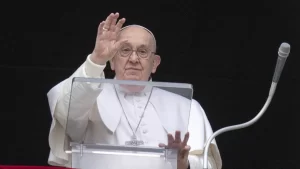 Pope Francis has sparked controversy with his recent comments suggesting that Ukraine should show “courage of the white flag” and engage in negotiations to end the ongoing conflict with Russia.
Pope Francis has sparked controversy with his recent comments suggesting that Ukraine should show “courage of the white flag” and engage in negotiations to end the ongoing conflict with Russia.
In an interview with Swiss broadcaster Radiotelevisione svizzera di lingua italiana (RSI), published on Saturday, the Pope was asked about the potential legitimacy of negotiations with the stronger party. He responded, “That is one interpretation. But I believe that the stronger party is the one who assesses the situation, considers the people involved, and has the courage to negotiate.” The Pope further emphasized that today, negotiations are feasible with the assistance of international powers.
The Pope’s remarks garnered swift reactions from Kyiv, which has suffered significant casualties and aims to reclaim its territories seized by Russia. Ukraine’s Foreign Minister Dmytro Kuleba took to social media to assert, “Our flag is yellow and blue. It is the flag we live by, die for, and prevail under. We shall never raise any other flags.” Kuleba emphasized that the strongest stance is to unequivocally support the cause of good and reject any notion of equating it with evil through negotiations.
Speaking before Ukrainians in New York, His Beatitude Sviatoslav, the Father and Head of the Ukrainian Greek Catholic Church, declared, “Ukraine is wounded but unconquered,” underscoring that concessions are not under consideration. He conveyed the resolute spirit of the Ukrainian people, stating, “Believe me, no one even thinks of surrender, even in the places where the fighting persists.”
Matteo Bruni, the Director of the Holy See Press Office, later clarified the Pope’s comments, stating that the Pope employed the image of the white flag, suggested by the interviewer, to symbolize a cessation of hostilities achieved through courageous negotiations, rather than surrendering. The Pope’s intention was to advocate for a truce and an end to the conflict.
The Pope’s remarks also drew criticism from other European leaders. Poland’s Foreign Minister Radosław Sikorski suggested that the Pope should encourage Russian President Vladimir Putin to demonstrate courage by withdrawing the Russian army from Ukraine, asserting that such action would bring immediate peace without the necessity for negotiations. Latvia’s President Edgars Rinkēvičs echoed this sentiment, emphasizing the importance of standing against evil and defeating it rather than capitulating.
Alexandra Valkenburg, the head of the EU delegation to the Holy See, pointed out that Russia initiated an illegal and unjustified war against Ukraine two years ago. She stressed that Russia has the power to end the conflict promptly by respecting Ukraine’s sovereignty and territorial integrity.
It is evident that Pope Francis’s remarks have ignited a lively debate, with various perspectives emerging on the best course of action to resolve the ongoing conflict between Ukraine and Russia.
Source: CNN

